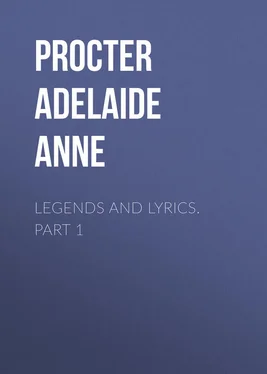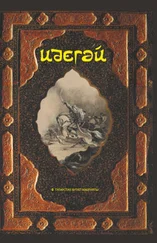Adelaide Procter - Legends and Lyrics. Part 1
Здесь есть возможность читать онлайн «Adelaide Procter - Legends and Lyrics. Part 1» — ознакомительный отрывок электронной книги совершенно бесплатно, а после прочтения отрывка купить полную версию. В некоторых случаях можно слушать аудио, скачать через торрент в формате fb2 и присутствует краткое содержание. Жанр: foreign_antique, foreign_prose, на английском языке. Описание произведения, (предисловие) а так же отзывы посетителей доступны на портале библиотеки ЛибКат.
- Название:Legends and Lyrics. Part 1
- Автор:
- Жанр:
- Год:неизвестен
- ISBN:нет данных
- Рейтинг книги:4 / 5. Голосов: 1
-
Избранное:Добавить в избранное
- Отзывы:
-
Ваша оценка:
- 80
- 1
- 2
- 3
- 4
- 5
Legends and Lyrics. Part 1: краткое содержание, описание и аннотация
Предлагаем к чтению аннотацию, описание, краткое содержание или предисловие (зависит от того, что написал сам автор книги «Legends and Lyrics. Part 1»). Если вы не нашли необходимую информацию о книге — напишите в комментариях, мы постараемся отыскать её.
Legends and Lyrics. Part 1 — читать онлайн ознакомительный отрывок
Ниже представлен текст книги, разбитый по страницам. Система сохранения места последней прочитанной страницы, позволяет с удобством читать онлайн бесплатно книгу «Legends and Lyrics. Part 1», без необходимости каждый раз заново искать на чём Вы остановились. Поставьте закладку, и сможете в любой момент перейти на страницу, на которой закончили чтение.
Интервал:
Закладка:
Adelaide Anne Procter
Legends and Lyrics. Part 1
DEDICATION
TO MATILDA M. HAYS.
“Our tokens of love are for the most part barbarous. Cold and lifeless, because they do not represent our life. The only gift is a portion of thyself. Therefore let the farmer give his corn; the miner, a gem; the sailor, coral and shells; the painter, his picture; and the poet, his poem.” – Emerson’s Essays.
A. A. P.
May, 1858
AN INTRODUCTION BY CHARLES DICKENS
In the spring of the year 1853, I observed, as conductor of the weekly journal Household Words , a short poem among the proffered contributions, very different, as I thought, from the shoal of verses perpetually setting through the office of such a periodical, and possessing much more merit. Its authoress was quite unknown to me. She was one Miss Mary Berwick, whom I had never heard of; and she was to be addressed by letter, if addressed at all, at a circulating library in the western district of London. Through this channel, Miss Berwick was informed that her poem was accepted, and was invited to send another. She complied, and became a regular and frequent contributor. Many letters passed between the journal and Miss Berwick, but Miss Berwick herself was never seen.
How we came gradually to establish, at the office of Household Words , that we knew all about Miss Berwick, I have never discovered. But we settled somehow, to our complete satisfaction, that she was governess in a family; that she went to Italy in that capacity, and returned; and that she had long been in the same family. We really knew nothing whatever of her, except that she was remarkably business-like, punctual, self-reliant, and reliable: so I suppose we insensibly invented the rest. For myself, my mother was not a more real personage to me, than Miss Berwick the governess became.
This went on until December, 1854, when the Christmas number, entitled The Seven Poor Travellers , was sent to press. Happening to be going to dine that day with an old and dear friend, distinguished in literature as Barry Cornwall, I took with me an early proof of that number, and remarked, as I laid it on the drawing-room table, that it contained a very pretty poem, written by a certain Miss Berwick. Next day brought me the disclosure that I had so spoken of the poem to the mother of its writer, in its writer’s presence; that I had no such correspondent in existence as Miss Berwick; and that the name had been assumed by Barry Cornwall’s eldest daughter, Miss Adelaide Anne Procter.
The anecdote I have here noted down, besides serving to explain why the parents of the late Miss Procter have looked to me for these poor words of remembrance of their lamented child, strikingly illustrates the honesty, independence, and quiet dignity, of the lady’s character. I had known her when she was very young; I had been honoured with her father’s friendship when I was myself a young aspirant; and she had said at home, “If I send him, in my own name, verses that he does not honestly like, either it will be very painful to him to return them, or he will print them for papa’s sake, and not for their own. So I have made up my mind to take my chance fairly with the unknown volunteers.”
Perhaps it requires an editor’s experience of the profoundly unreasonable grounds on which he is often urged to accept unsuitable articles – such as having been to school with the writer’s husband’s brother-in-law, or having lent an alpenstock in Switzerland to the writer’s wife’s nephew, when that interesting stranger had broken his own – fully to appreciate the delicacy and the self-respect of this resolution.
Some verses by Miss Procter had been published in the Book of Beauty , ten years before she became Miss Berwick. With the exception of two poems in the Cornhill Magazine , two in Good Words , and others in a little book called A Chaplet of Verses (issued in 1862 for the benefit of a Night Refuge), her published writings first appeared in Household Words , or All the Year Round . The present edition contains the whole of her Legends and Lyrics , and originates in the great favour with which they have been received by the public.
Miss Procter was born in Bedford Square, London, on the 30th of October, 1825. Her love of poetry was conspicuous at so early an age, that I have before me a tiny album made of small note-paper, into which her favourite passages were copied for her by her mother’s hand before she herself could write. It looks as if she had carried it about, as another little girl might have carried a doll. She soon displayed a remarkable memory, and great quickness of apprehension. When she was quite a young child, she learned with facility several of the problems of Euclid. As she grew older, she acquired the French, Italian, and German languages; became a clever pianoforte player; and showed a true taste and sentiment in drawing. But, as soon as she had completely vanquished the difficulties of any one branch of study, it was her way to lose interest in it, and pass to another. While her mental resources were being trained, it was not at all suspected in her family that she had any gift of authorship, or any ambition to become a writer. Her father had no idea of her having ever attempted to turn a rhyme, until her first little poem saw the light in print.
When she attained to womanhood, she had read an extraordinary number of books, and throughout her life she was always largely adding to the number. In 1853 she went to Turin and its neighbourhood, on a visit to her aunt, a Roman Catholic lady. As Miss Procter had herself professed the Roman Catholic Faith two years before, she entered with the greater ardour on the study of the Piedmontese dialect, and the observation of the habits and manners of the peasantry. In the former, she soon became a proficient. On the latter head, I extract from her familiar letters written home to England at the time, two pleasant pieces of description.
A BETROTHAL
“We have been to a ball, of which I must give you a description. Last Tuesday we had just done dinner at about seven, and stepped out into the balcony to look at the remains of the sunset behind the mountains, when we heard very distinctly a band of music, which rather excited my astonishment, as a solitary organ is the utmost that toils up here. I went out of the room for a few minutes, and, on my returning, Emily said, ‘Oh! That band is playing at the farmer’s near here. The daughter is fiancée to-day, and they have a ball.’ I said, ‘I wish I was going!’ ‘Well,’ replied she, ‘the farmer’s wife did call to invite us.’ ‘Then I shall certainly go,’ I exclaimed. I applied to Madame B., who said she would like it very much, and we had better go, children and all. Some of the servants were already gone. We rushed away to put on some shawls, and put off any shred of black we might have about us (as the people would have been quite annoyed if we had appeared on such an occasion with any black), and we started. When we reached the farmer’s, which is a stone’s throw above our house, we were received with great enthusiasm; the only drawback being, that no one spoke French, and we did not yet speak Piedmontese. We were placed on a bench against the wall, and the people went on dancing. The room was a large whitewashed kitchen (I suppose), with several large pictures in black frames, and very smoky. I distinguished the Martyrdom of Saint Sebastian, and the others appeared equally lively and appropriate subjects. Whether they were Old Masters or not, and if so, by whom, I could not ascertain. The band were seated opposite us. Five men, with wind instruments, part of the band of the National Guard, to which the farmer’s sons belong. They played really admirably, and I began to be afraid that some idea of our dignity would prevent me getting a partner; so, by Madame B.’s advice, I went up to the bride, and offered to dance with her. Such a handsome young woman! Like one of Uwins’s pictures. Very dark, with a quantity of black hair, and on an immense scale. The children were already dancing, as well as the maids. After we came to an end of our dance, which was what they called a Polka-Mazourka, I saw the bride trying to screw up the courage of her
Читать дальшеИнтервал:
Закладка:
Похожие книги на «Legends and Lyrics. Part 1»
Представляем Вашему вниманию похожие книги на «Legends and Lyrics. Part 1» списком для выбора. Мы отобрали схожую по названию и смыслу литературу в надежде предоставить читателям больше вариантов отыскать новые, интересные, ещё непрочитанные произведения.
Обсуждение, отзывы о книге «Legends and Lyrics. Part 1» и просто собственные мнения читателей. Оставьте ваши комментарии, напишите, что Вы думаете о произведении, его смысле или главных героях. Укажите что конкретно понравилось, а что нет, и почему Вы так считаете.












